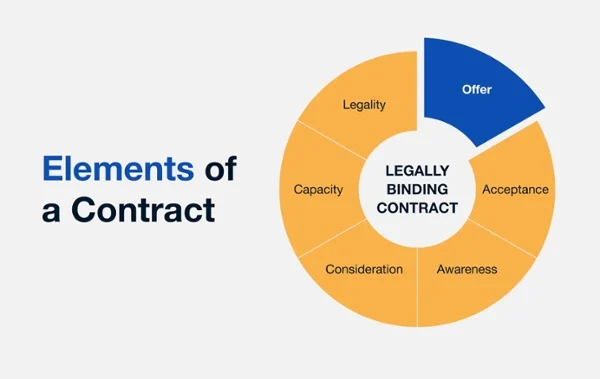A contract is a legally binding agreement between two or more parties, which outlines the terms and conditions they have agreed upon. For a contract to be valid and enforceable, certain essential elements must be present. Let’s explore the key elements of a contract.
Key Elements of a Contract
1. Offer
- True: The first element of a contract is an offer. One party proposes terms to another, indicating their willingness to enter into an agreement. An offer can be a proposal to provide goods, services, or something else of value in exchange for a specified consideration.
2. Acceptance
- True: Acceptance is when the party receiving the offer agrees to the terms set out in the offer. Acceptance must be clear, unequivocal, and communicated to the offeror. If the offer is accepted, the parties are bound by the agreed terms.
3. Consideration
- True: Consideration refers to something of value that is exchanged between the parties. This could be money, services, goods, or promises. For a contract to be valid, each party must provide consideration to the other.
4. Mutual Agreement
- True: Mutual agreement, or “meeting of the minds,” is when both parties understand and agree on the terms of the contract. Both parties must have the intention to be legally bound by the contract and must consent freely, without being coerced or deceived.
5. Legality
- True: The subject matter of the contract must be legal. A contract cannot be formed for illegal activities or actions that violate the law. If the contract’s purpose is illegal, it is void and unenforceable.
6. Capacity
- True: Capacity refers to the legal ability of the parties to enter into a contract. To have the capacity to contract, the parties must be of legal age, typically 18 or older, and mentally competent. Minors, individuals with mental incapacity, or intoxicated persons generally cannot enter into a binding contract.
7. Form
- True: Form refers to the requirement that some contracts must be in writing to be legally enforceable. For example, contracts related to real estate transactions or those that cannot be performed within one year often need to be written.
Conclusion
The elements of a contract include offer, acceptance, consideration, mutual agreement, legality, capacity, and form. These elements are essential for a contract to be valid and legally enforceable. Without these components, a contract may be deemed void or unenforceable.








